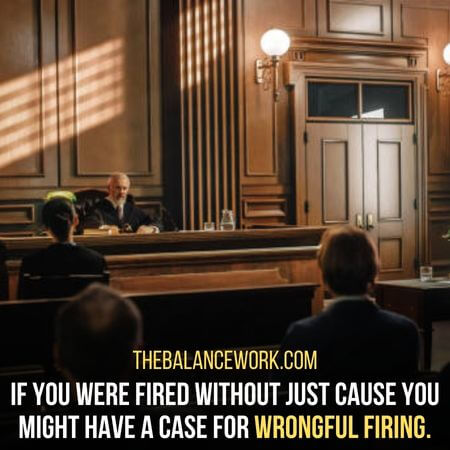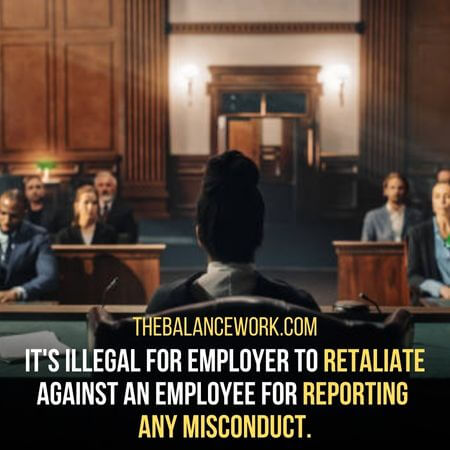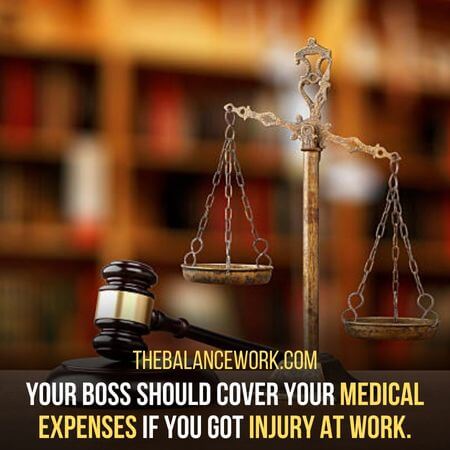Reasons to sue boss never seem to be in short supply. While many employers treat their employees fairly, there are always a few bad apples who engage in misconduct.
Legal action against an employer needs to be well founded. However, you may be out of a job and facing a lawsuit.
17 Reasons To Sue Boss
Starting from the top, here are a few reasons why you might want to take legal action against your boss:
1. Wrongful Termination:
If you were fired without just cause, you might have a case for wrongful termination. This legal action is usually only successful if you can prove it.
Prove that your employer targeted you for illegal reasons. For instance, because of your race, religion, or gender.

You must show that other employees without such characteristics were not treated the same way.
And it can be challenging to win a wrongful termination lawsuit. But if you have strong evidence, it may be worth pursuing.
Some situations leading to wrongful termination may also be “constructive dismissal.”
This is when an employer makes conditions so intolerable. Here any reasonable person would feel they had no choice but to resign.
2. Discrimination:
Discrimination in the workplace is unlawful. You may have a case if you can prove they didn’t treat you well. That is because of your race, religion, nationality, or another characteristic.
Discrimination also includes sexual harassment. This is unwelcome conduct of a sexual nature. It creates an offensive working environment.
Some offensive signs of discrimination in the workplace include:
– Jokes or comments about a person’s race, religion, nationality, or other characteristics.
– Displaying offensive images or symbols.
– Making unwelcome sexual advances.
If your boss discriminates against you, you may want to take legal action. And this is especially true if the discrimination is severe.
3. Harassment Case:
Harassment is any behavior that creates a hostile work environment. It includes actions like making offensive comments or jokes. It also includes physical violence and sexual harassment.
Harassment is a form of discrimination. So, the same laws that prohibit discrimination also apply to harassment.
The Civil Rights Act of 1964 makes it illegal to harass someone because of their race, religion, or national origin.
If you are being physically threatened, for instance, you can sue boss and the company.
However, to win a harassment lawsuit, you will need to prove that the harassment was:
– Severe or pervasive
– Created a hostile work environment
– Because of a characteristic like race or gender
4. Violation of Employment Contract:
If your employer has violated terms of employment contract, that’s breach of contract.
For instance, if your boss promised you a certain salary. But then failed to pay it, they may have breached the contract.
Or, if they promised certain benefits but did not receive them, you may have a case.
To win a breach of contract lawsuit, you will need to show that:
– There was an employment contract
– The employer violated the terms of the contract
– You suffered damages as a result of the breach
How can you potentially suffer? If the breach of contract has cost you money, for instance. Or if it has resulted in you losing your job.
5. Retaliation:
It’s illegal for an employer to retaliate against an employee for reporting misconduct.
Retaliation can take many forms, including demotion, termination, and salary cuts.
If you think your boss is retaliating against you, that’s one of the reasons to sue the boss.

You can make a lawsuit case by proving the action via emails or other documentation.
However, it can be difficult to prove retaliation. So it’s essential to consult with an experienced attorney before taking legal action.
An employer may take adverse action against an employee for a legitimate reason.
For instance, if an employee got termination for poor performance, that’s not retaliation.
But if firing occurs shortly after employee reports misconduct, that could be retaliation.
6. Unpaid Wages:
If you do not get the wages you’re owed, that’s another reason to sue boss.
Wage and hour laws vary from state to state. But there are federal laws that set minimum standards.
Fair Labor Standards Act (FLSA) requires employers to pay employees for overtime work.
If you do not get salary proper, you can file a lawsuit against your boss. You will need to prove that you were not paid the wages you’re owed.
And you will also need to prove that your boss knew or should have known they were not paying you correctly.
You can prove so by providing documentation like pay stubs and time sheets.
7. Unpaid Overtime:
You may be liable to get overtime pay if you work more than 40 hours a week.
Federal law need employers to pay time-and-a-half for every hour over 40 an employee works.
Some states have laws about overtime pay. And in some cases, those laws may be more favorable to employees.
And when it comes to overtime pay, there are a few exceptions. For instance, some employees are exempt from the overtime laws. These include executive, administrative, and employees.
Sometimes employers try to avoid paying overtime by misclassifying employees as exempt.
If you think they misclassified you, that’s one of the reasons to sue your boss.
8. Workplace Safety Violations:
Federal and state laws govern workplace safety. These laws need employers to provide employees with a safe work environment.
If your boss has violated these laws, you may have a case. Violations can include things like failing to provide proper safety equipment.
Or failure to address a hazardous condition in the workplace. And you have to prove how the violation led to your injury.
For instance, if you got injury because you didn’t have the proper safety gear.
Or if you got injury because your boss failed to address a fire in the workplace.
9. Mental Stress:
If you’re suffering from mental stress because of your job, that’s another one of the reasons to sue boss.
To win a case like this, you’ll need to prove that the stress was so severe that it caused a physical injury.
Or that it resulted in a mental illness. Your psychologist or psychiatrist can help you prove this.
They can provide expert testimony about how the job has affected your mental health.
For instance, if you got diagnosed with post-traumatic stress disorder (PTSD).
Or if you got diagnosed with depression or anxiety due to your job.
10. Company Insurance Is Not Covering Your Injury:
Your boss should cover your medical expenses if you got injury at work.
But sometimes, bosses try to get out of paying by claiming that the injury was not work-related.

Or they may try to say that you were at fault for the accident. If this happens, you may need to sue your boss to get the benefits you’re entitled to.
For instance, if you got injury in a car accident while on the job. Or if you got injury because of a slip and fall at work.
11. No Lunch Breaks:
If you’re not given proper lunch breaks, that’s another one of the reasons to sue boss.
Federal law needs employers to give employees a 30-minute break for every 5 hours worked.
Some states have laws about lunch breaks. And in some cases, those laws may be more favorable to employees.
Some states need employers to give employees a 60-minute lunch break every 6 hours worked.
So if you’re not given proper lunch breaks, you may get compensation.
Some bosses try to get around the lunch break laws by having employees work through their breaks.
If this has happened to you, you should consult with an attorney to see if you have a case.
12. Denied Promotions:
If they denied a promotion you qualified for, here’s your case. To win a case like this, you’ll need to prove that you qualified for the position.
And that they denied the promotion because of your race, gender, etc.
For instance, if you’re a woman who did not get a promotion because of your gender.
Or if you’re a minority not getting a promotion because of your race. This is a type of discrimination.
13. Refusal To Medical Leaves:
Federal law requires employers to provide employees with paid and unpaid medical leave.
If your boss has refused to give you the leave you’re entitled to, you can file a case against it.
For instance, if you’re entitled to 12 weeks of unpaid leave under the Family and Medical Leave Act (FMLA).
And your boss has only given you six weeks of leave. Or if you’re entitled to paid leave under the Americans with Disabilities Act (ADA).
And your boss has refused to give you the leave. Some employers try to offer employees paid vacation time instead of paid leave.
You will have to consult with an attorney to see if this is the case.
14. Unfair Disciplinary Action:
Disciplinary action should be fair and consistent. If you feel you got mistreated, here’s your case.
You can sue your boss if you’ve got disciplined for the reason that’s not valid.
For instance, if you’re disciplined for something that’s not in the company policy.
Or if you’re disciplined for something other employees have done. But they weren’t disciplined for.
You can also use your boss if treated more harshly than other employees.
For instance, if you’re given a written warning for something. But another employee was only verbally reprimanded.
15. Defamation:
Defamation is when someone makes a false statement about you. And it harms your reputation.
For instance, if your boss has accused you of something you didn’t do.

Or if your boss has spread rumors about you that are not true. Suppose you can prove that the statements were false. And that they harmed your reputation.
Defamation can take many forms. It can be verbal, written, or even through social media.
Or any other type of communication. You can sue your boss if you’ve been the victim of defamation.
16. Bad Reference:
If you’ve left a job on good terms and your boss gives you a bad reference, you can sue them for defamation.
The same goes for a prospective employer. For instance, if your boss has lied about your job performance. Or if they did not give a fair assessment of your skills.
Suppose you can prove that the statements were false and that they cost you a job. You may be able to sue your boss.
17. Violation Of Trade Secrets:
Suppose you’ve developed a trade secret while working for your boss. And they’ve stolen it or used it without your permission.
You can sue them for violating your trade secret. A trade secret is a piece of information. That has value because it’s not known to the general public.
For instance, a recipe for a new type of food your food business sells. Or a new way to make a product.
To win a case like this, you’ll need to prove that the information is a trade secret.
And that your boss has stolen it or used it without your permission.
Final Word:
These are some of the most common reasons to sue boss. If you’re considering suing your boss, you must consult with an attorney to see if you have a case.
An attorney can help you gather evidence and build a strong case. And have concrete evidence to back up your claims.
Only if you can prove you case, can you win it.
Last Updated on 1 year by Shahzaib Arshad
- 7 Great Signs Your Boss Wants to Help You - October 8, 2023
- How To Explain Dropping Out Of Law School? Detailed Guide - September 6, 2023
- 10 Reasons Employees Get Fired in Workplace - August 27, 2023